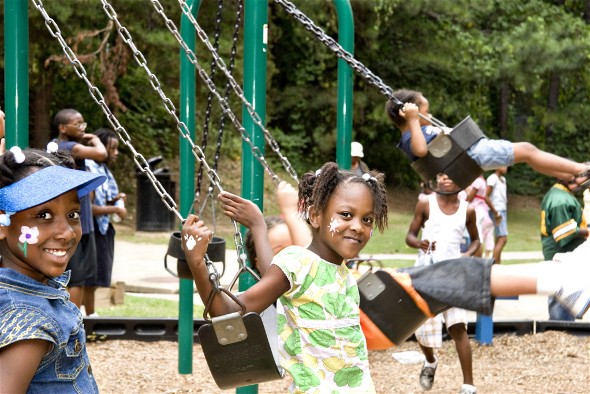One Surefire Parenting Tip To Help Avoid Meltdowns and Power Struggles
 I’ve spent a lot of time this summer with my daughter at a particular Atlanta playground, becoming intimately familiar with, among other things, how slides are not made for my adult rear end, how seesaws take significant leg muscles, and how to apply sunscreen to my child’s face before she starts crying.
I’ve spent a lot of time this summer with my daughter at a particular Atlanta playground, becoming intimately familiar with, among other things, how slides are not made for my adult rear end, how seesaws take significant leg muscles, and how to apply sunscreen to my child’s face before she starts crying.
I’ve also gotten the chance to observe other parents with their own children, and have seen a pattern play out so frequently that I can write it out, word for word, for your very eyes.
Parent: Are you ready to go home?
Kid: No.
Parent, a few minutes later: Would you like to go have dinner?
Kid: No.
Parent, a few minutes later, sounding less patient: You look tired. Would you like to go home?
Kid: No.
The only reason this conversation hasn’t happened to me is because my daughter only knows one word so far and that word is “dog.” But I’m sure some variation of this situation will happen, soon enough, and that’s because it is so easy to fall into the parenting trap in which we ask questions offering our kids choices that we don’t actually want them to have. These false choices lead to fights, irritation on both ends, power struggles, and meltdowns — in other words, our least favorite parts of parenting.
At the playground, when parents ask, “Are you ready to go home?” they usually want their kid to say yes. But by asking that questions, those same parents are usually setting themselves up to hear a resounding “no.”
After all, kids don’t respond to what’s implied — they’re too young and too literal. They respond to what’s asked. And of course they don’t want to go home from the playground! They’re simply giving an honest answer to the question.
So here’s a parenting tip from my therapy office. Don’t ask your kids questions about what they want if what they want isn’t going to be okay with you. If you are absolutely against your kid wearing his favorite dinosaur pajamas to school for the fifth day in a row, instead of asking, “What do you want to wear today?” ask a different question. (“Which of these three outfits do you want to wear today?” is a good start.) Instead of asking your child, “Do you want to brush your teeth now?” you can offer them a more narrow choice. (“Would you like to brush your teeth now or in five minutes?”) Think of these sorts of questions as a form of limit setting that still empowers your child to make age-appropriate choices for him or herself.
It’s a small change that I hope can make life a little bit easier for you and your family.


